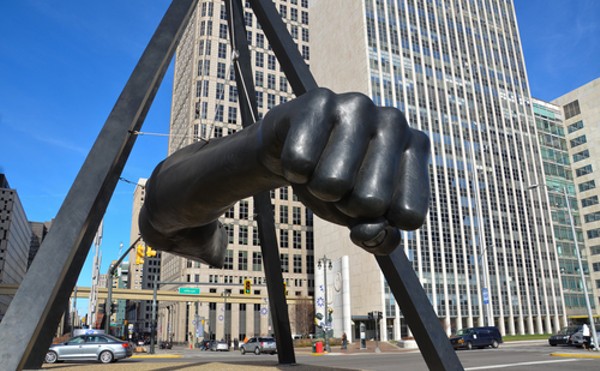With her supporters packing the 36th District courtroom of Judge Michael Hathaway on Monday, Michigan Citizen freelance reporter Diane Bukowski was placed on probation for a year, fined $4,000, and ordered to perform 200 hours of community service at the Capuchin Soup Kitchen in Detroit.
A jury last month found Bukowski guilty on two felony counts of assaulting, resisting or obstructing a police officer after she allegedly crossed a police line and began taking photos of a fatal accident involving a motorcyclist who struck a pedestrian while fleeing from Michigan State Police on Detroit's west side last November.
Bukowski continues to maintain her innocence and has vowed to appeal. Her lack of contrition was cited as one of the reasons the Wayne County Prosecutor's Office asked the judge to place Bukowski on probation for five years.
"She doesn't have a clue she did anything wrong," assistant prosecutor Thomas Trzcinski told the judge. There was a hostile crowd gathered at the scene of the accident, and Bukowski's actions made the job of the police "100 percent harder that day," Trzcinski said.
The lengthy probation time would also help send a message to other reporters that they need to follow police orders, Trzcinski said.
Trzcinski also wanted the judge to order Bukowski — whom the prosecutor said was trying to "wrap herself in the First Amendment" — to take a journalism ethics class. Hathaway declined to send Bukowski, who's been a reporter for 10 years, back to the classroom.
"That would come perilously close to altering her point of view," said the judge. "She has her point of view, and that's her right."
Not that the judge is necessarily a big fan of that viewpoint. Describing Bukowski as someone who attempted to portray herself as a truth-telling crusader during trial, Hathaway chided the reporter for "lapses I find troubling."
He seemed particularly bothered after finding out that one of two character witnesses who testified on her behalf — activist and attorney Jerome Goldberg — had once been married to Bukowski. Failing to disclose that fact during the trial was, said the judge, "very disingenuous."
Hathaway also made clear that both during the trial and while deciding Bukowski's sentence, it was his intent to keep "politics" from becoming an issue. Bukowski has maintained that she was prosecuted because of previous stories she did critical of the Detroit Police Department and the Wayne County Prosecutor's Office.
He also leveled criticism at some of the police actions in the case. One officer deleted photos Bukowski had taken. One of her lawyers has said that doing so was clearly obstruction of justice and that for the prosecutor not to press charges is a "dereliction of duty."
"Neither side," said Hathaway, "came to the table with clean hands."
Two new lawyers — John F. Royal and former Detroit City Council member Sharon McPhail — were with Bukowski in court Monday.
Noting the numerous letters of support provided to the judge, including references to Bukowski's willingness "to put herself in harm's way" in order to report stories, McPhail downplayed the significance of Bukowski's transgression.
"This is a blip on the radar screen of her life," McPhail said.
But it's a blip that won't be going away anytime soon.
Attorney Royal said after the sentencing that there were numerous grounds for appeal. Among other things, he contends that during Bukowski's preliminary exam, Judge Beverly Hayes-Sipes ruled that, even if Bukowski did enter the crime scene, that didn't violate the statute she was charged with, and should not have been an issue during the trial.
However, the allegation that she crossed the yellow police crime scene tape became a focal point of the trial. At one point Trzcinski told the jury that act alone was enough for them to find her guilty.
Royal said the only question should be whether Bukowski resisted officers once she was put under arrest. That arrest was captured on videotape by Fox 2 and shown during trial. Having seen it several times, News Hits is of the firm opinion Bukowski provided no resistance.
The case has received attention beyond Detroit. Among those watching has been the Committee to Protect Journalists, a nonprofit group created to help protect reporters worldwide.
"We are monitoring the proceedings closely because of their implications for press freedom," said Joel Simon, CPJ's executive director. "We are particularly troubled that a state trooper deleted two photographs. The prosecution strikes us as excessive, and we worry that it could send a message to reporters that covering an accident or crime scene could make them subject to felony charges."
Trzcinski has said he had no knowledge of Bukowski or her work before she was charged. Also, there's never been any evidence that the Michigan State Troopers who arrested her had any knowledge of her work.
Even so, Bukowski asserts that the prosecution has a potentially chilling effect. "I'm very concerned about the state of the First Amendment," she said.
As for the prosecutor's request that she return to the classroom to take a course on journalism ethics, Bukowski, a former city of Detroit employee who retired a decade ago to pursue a new career, said, "I've been a reporter for 10 years. I have on-the-job training."
News Hits is edited by Curt Guyette. Contact him at 313-202-8004 or [email protected]




